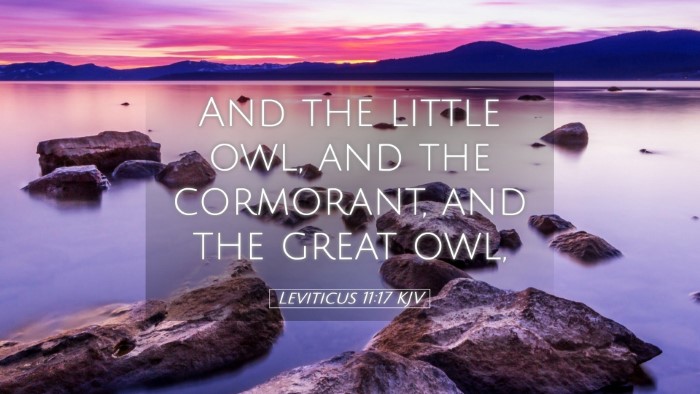Commentary on Leviticus 11:17
Verse: "And the pelican, and the gier eagle, and the cormorant,"
Leviticus 11 presents God's instructions regarding clean and unclean animals, which plays a critical role in the life of the Israelite community. Understanding these laws requires examining their spiritual, ceremonial, and practical implications.
Overall Context
The book of Leviticus is primarily focused on the holiness of God and His people. In chapters 11 through 15, the text outlines various laws regarding dietary restrictions, which reflect a larger theme of separation from impurity and the call to holiness. The dietary laws are not simply arbitrary rules; they serve a deeper purpose in fostering a mindset of purity while drawing Israel's attention to God's nature.
Insights from Public Domain Commentaries
Matthew Henry's Commentary
Matthew Henry emphasizes that the dietary laws illustrate God's authority over creation. These guidelines serve not only as physical directives but also as spiritual lessons on maintaining holiness. He points out that the pelican, gier eagle, and cormorant symbolize different aspects of what makes animals unclean:
- Pelican: Known for its scavenging nature, the pelican is often associated with death and decay.
- Gier Eagle: This bird is noted for its predatory nature, feeding on carrion, thus avoiding clean dietary laws.
- Cormorant: A waterfowl that also symbolizes unclean habits, reflecting an overall theme of divine separation.
Henry further notes that by prohibiting certain animals, God is teaching His people to reflect on their behavior. The physical act of abstaining from unclean animals becomes a metaphor for spiritual cleanliness, urging Israelites to avoid spiritual corruption.
Albert Barnes' Notes
Albert Barnes stresses the practical side of these laws, suggesting they were designed to safeguard the health of the Israelites. He suggests that many of the prohibited animals, including those like the pelican and gier eagle, may have exhibited harmful behaviors or tendencies that could lead to disease or spoilage of food. In this way, Barnes aligns the divine commandments with practical wellness considerations for the Israelite community.
Moreover, Barnes notes that these laws served a dual role of distinguishing Israel from surrounding nations, where various pagan practices included consuming all forms of meat, including those considered unclean. This separation establishes Israel's identity as a holy nation set apart for God, echoing themes found throughout the Old Testament of covenantal fidelity and maintaining purity.
Adam Clarke's Commentary
Adam Clarke adds a scholarly depth to the discussion of the cited birds and their unclean designation. He explains that these classifications emerge from a broader understanding of "clean" versus "unclean" and serve as a typological reflection of moral and spiritual integrity. The animals mentioned not only relate to physical properties but also correlate with man’s spiritual walk.
Clarke indicates that the prohibition of these birds calls believers to consider how they relate to their surroundings. Like these unclean creatures, believers are often metaphorically in environments that can lead them astray, thus drawing a parallel to the need for vigilance against moral decay and spiritual contamination.
Theological Implications
Those studying this verse recognize the deep-rooted theological implications within the dietary laws:
- Holiness: The call to be separate and distinct reinforces God's holiness and the necessity for His people to reflect that attribute in their lives.
- Identity: These laws form a significant part of Israel's identity as the chosen people, illustrating how their behavior sets them apart.
- Spiritual Discipline: Abstaining from unclean animals fosters self-control and righteousness, essential traits for believers as they navigate a world often fraught with moral ambiguity.
Conclusion
In conclusion, Leviticus 11:17 invites the faithful to reflect on more than just dietary laws; it encourages a holistic understanding of holiness, identity, and the implications of living in accordance with God's commands. Scholars and theologians alike can extract profound lessons from these verses, reminding themselves and their congregations to pursue purity of heart and conduct.


